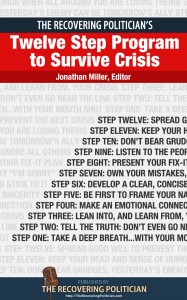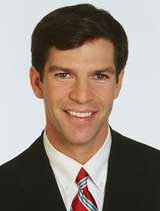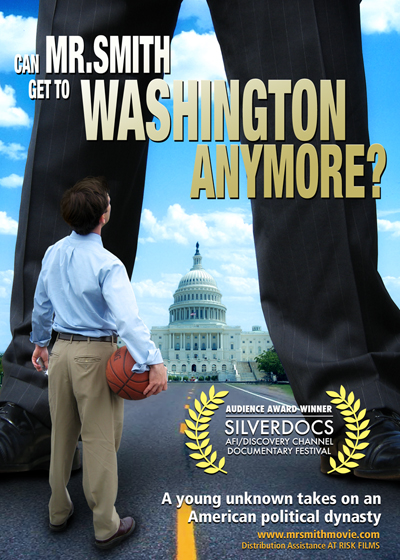By RP Staff, on Mon Jul 15, 2013 at 10:00 AM ET From Bob Priddy of Missouri.net
  They call themselves “recovering politicians”—political figures whose careers and dreams have come crashing down because of scandals. Two of them are Missourians. They call themselves “recovering politicians”—political figures whose careers and dreams have come crashing down because of scandals. Two of them are Missourians.
State Senator Jeff Smith was a rising star in the Democratic Party when he went to federal prison for a year for lying to federal investigators about a minor campaign finance law violation. Former Speaker of the House Rod Jetton was looking at a lucrative career as a political consultant when he became entangled in a one-night stand of rough sex. He avoided prison by pleading guilty to a misdemeanor charge. But his political career, like Smith’s, was ruined.
Smith knew as soon as he heard that an associate had been charged with a series of non-campaign crimes that he was political toast. “In just a few moments of weakness in that first campaign, I now realized that I’d thrown away everything that I’d worked for all my life,” he told county officials last November.
And Jetton realized as soon as his incident became public that he could not avoid admitting what he’d done—to his father, a Baptist minister. “That pretty much strips your pride away,” he has told us.
Their book is called “The Recovering Politician’s Twelve Step Program to Survive Crisis.” Smith and Jetton are two of about a dozen former office-holders whose lives have taken new directions since their falls from grace. Jetton now is in private business and is president of a political newspaper that covers the Capitol. Smith now is a political science college teacher in New York and has written several political articles for national magazines.
The book: The Recovering Politician’s Twelve Step Program to Survive Crisis, …
 AUDIO: Jetton interview 14:34 AUDIO: Jetton interview 14:34
 AUDIO: Smith speech to Mo. Assn. of Counties 1:05:00 AUDIO: Smith speech to Mo. Assn. of Counties 1:05:00
Jetton’s Chapter:
http://therecoveringpolitician.com/contributors/rodj/rod-jetton-big-success-can-lead-to-big-failure-an-exclusive-excerpt-from-the-recovering-politicians-twelve-step-program-to-survive-crisis
Smith wrote an op-ed piece for the Sept. 8 2009 Post-Dispatch:
http://www.stltoday.com/news/local/govt-and-politics/political-fix/jeff-smith-i-was-stupid-and-wrong/article_caacb873-6399-5d02-803f-a22b22fd7f21.html
By Jeff Smith, on Tue Jun 25, 2013 at 10:00 AM ET Some people just can’t catch a break: A man with 140lb testicles is unhappy with removal surgery after the operation leaves him with a 1 inch penis. [New York Post]
By Jeff Smith, on Mon Jun 17, 2013 at 10:00 AM ET  Q: I recently listened to your interview on NPR and applaud you for your comeback after spending time in a federal institution. I was on my way back to academia when I was arrested while being a practicing psychologist for two counts of fraud. I got 21 months. I have no criminal record prior to this and am very concerned about my future beyond incarceration. Any thoughts? Right now I am still in the numb/ embarrassment stage. Q: I recently listened to your interview on NPR and applaud you for your comeback after spending time in a federal institution. I was on my way back to academia when I was arrested while being a practicing psychologist for two counts of fraud. I got 21 months. I have no criminal record prior to this and am very concerned about my future beyond incarceration. Any thoughts? Right now I am still in the numb/ embarrassment stage.
—R.V., A City in Calif.
I actually have a chapter in a new book about recovering from crisis. I think the key is to repair and reinvent yourself in a way that stays true to the best of who you are. For instance, if you lose your professional license, could you still offer counseling at a halfway house after you complete your sentence? Or perhaps at a shelter for the homeless or victims of domestic violence?Something that will be therapeutic for you and helpful for others. For me that’s taken many forms, from teaching about the legislative process and addressing elected officials about ethical dilemmas to advocating for educational opportunities inside prison.
I won’t lie to you: Prison sucks. But it forced me to pause and reflect and thus gave me an advantage over the Sanfords and Weiners on the road to recovery. It can do that for you, but you must constantly remind yourself that failure is not falling down but staying down.
(And if you’re interested in the book, co-authored by a dozen elected officials who each faced crises and came back strong, it’s called The Recovering Politician’s Twelve Step Program to Survive Crisis, and it’s available on Amazon.)
Q: I want to run campaigns, but getting a job as a manager is quite difficult. Candidates have two main problems: They often seem to think that they do not need to be managed, and when they do, they do not want to spend money for a salary. Of course, it is full-time work that is simply too much to ask of a volunteer. I have spent a lot of time on campaigns in general, and last year in particular. Consequently, I have taken the position that I will not do any more free work for politicians—I’ve seen that it usually does not pay off. I do not like sitting on the sidelines. Do you have any ideas?
—C.B., New York CityI totally agree with the paradox you reference regarding candidates and campaign managers. As I’ve said before, candidates who try to run their own campaigns have a fool for a manager.
I think you should broaden your search and consider working for an issue campaign instead. There are lots of benefits to that; for instance: (1) no lying awake at night wondering if your candidate will make a campaign-ending faux pas; (2) no screaming candidate calling your cell at 2 a.m. to berate you about a typo in an email you did not write; (3) no frantic middle-of-the-night calls to bail the candidate’s son out of jail.
Most important, when you work for an issue campaign, you don’t have to worry if the candidate will actually follow through on the campaign pledge that motivated you to work on his behalf, because an issue never lies. And you don’t have to worry that your candidate’s efforts to follow through will be scuttled by her evil colleagues in the legislature, or wherever. So if you win an issue campaign, you really do win.
Read the rest of…
Jeff Smith: Do As I Say — A Political Advice Column
By RP Staff, on Thu Jun 13, 2013 at 4:57 PM ET  Click here to order
Our new book, The Recovering Politician’s Twelve-Step Program to Survive Crisis, has hit the national zeitgiest, as it was today’s topic of discussion on HuffPost Live.
Huff Post Live’s Marc Lamont Hill talks with three of the book’s co-authors about politics, rhetoric, and their 12-step program for recovering politicians.
Originally aired on June 13, 2013
Guests:
- Michael Steele @steele_michael (New York , NY) Former RNC Chairman
- Jeff Smith @JeffSmithMO (Montclair, NJ) Assistant Professor in the Urban Policy Graduate Program at the New School; Former State Senator for Inner City St. Louis
- Jonathan Miller @RecoveringPol (Chicago, IL) Former Kentucky State Treasurer; Editor of ‘The Recovering Politician’s Twelve Step Program to Survive Crisis’
By Jeff Smith, on Thu Jun 13, 2013 at 10:00 AM ET Last month, Rep. Michele Bachmann announced her decision not to seek a fifth term amid an array of ethics charges, one of which is an allegation that she secretly paid Iowa state Sen. Kent Sorenson for his support during her abortive presidential bid. According to NBC, Bachmann’s former chief of staff, Andy Parrish, swore in an affidavit to the Iowa Senate Ethics Committee that Bachmann “knew of and approved” a scheme to funnel $7,500 per month to Sorenson through an allied consulting firm in exchange for his backing, despite Iowa Senate ethics rules barring lawmakers from receiving presidential campaign payments. In his affidavit, Parrish called Bachmann an “outstanding public servant,” suggesting he had no axe to grind. Sorenson flatly denies any violation of ethics rules, and says he received money only to cover expenses. While gleeful liberals and dismayed Tea Partiers have mostly overlooked the charge in the wake of her announcement, it may be an important harbinger of future election cycles.
To understand why, you have to start with turn-of-the-century urban machine politics. Early get-out-the-vote (GOTV) systems relied on money changing hands through employment: Party bosses, generally divided by ethnicity, rounded up votes from ethnic neighborhoods in exchange for control over the abundant patronage positions available in rapidly-growing cities. At first the practice was confined to European immigrant populations, but African American voters were gradually included. In Chicago, for instance, blacks were gradually incorporated into the machine by powerbrokers like the late Rep. William Dawson, and were offered municipal positions like the one held by Fraser Robinson III, a pump worker at the city’s water plant (and Michelle Obama’s father).
 Many American cities have a storied tradition of machine politics. But in recent decades, party electioneering has evolved into arrangements whereby candidates and parties pay people small amounts of cash in exchange for GOTV efforts like canvassing. When I represented an inner-city St. Louis state Senate district, I was often approached by operatives proposing such arrangements. That’s not strictly illegal, but it creates a lot of untraceable campaign cash, and it’s vulnerable to corruption. (Although I declined, I did run afoul of federal campaign-finance law during my 2004 U.S. House race: I approved coordination between two aides and an outside party who created a flier about my opponent’s legislative attendance record. I then lied when asked about it, earning me eight months in federal prison for obstruction of justice.) I know people who have disbursed several hundred thousand dollars on Election Day. In some cases, the process is blunter, not to mention illegal: Low-level operatives simply distribute cash in even smaller increments to individual voters. Many American cities have a storied tradition of machine politics. But in recent decades, party electioneering has evolved into arrangements whereby candidates and parties pay people small amounts of cash in exchange for GOTV efforts like canvassing. When I represented an inner-city St. Louis state Senate district, I was often approached by operatives proposing such arrangements. That’s not strictly illegal, but it creates a lot of untraceable campaign cash, and it’s vulnerable to corruption. (Although I declined, I did run afoul of federal campaign-finance law during my 2004 U.S. House race: I approved coordination between two aides and an outside party who created a flier about my opponent’s legislative attendance record. I then lied when asked about it, earning me eight months in federal prison for obstruction of justice.) I know people who have disbursed several hundred thousand dollars on Election Day. In some cases, the process is blunter, not to mention illegal: Low-level operatives simply distribute cash in even smaller increments to individual voters.
In St. Louis, local powerbrokers often steered “street money” through a trusted ally or relative — and, according to scuttlebutt, siphoned off a chunk for themselves. Sometimes a powerbroker will even dole out money to low-level party functionaries himself. In 2004, John Kerry reportedly dropped hundreds of thousands on the street in Philadelphia alone, though ultimately the Republicans’ all-volunteer ground game was widely seen as superior — and Kerry lost.
Read the rest of…
Jeff Smith: ‘Walking-Around Money’ — How Machine Politics Works in America Today
By RP Staff, on Tue Jun 11, 2013 at 3:04 PM ET  Click here for the best-of articles on his political rise, term in federal prison, and launch of his second act. Click here for the best-of articles on his political rise, term in federal prison, and launch of his second act.
Click here to check out the new book Jeff has co-authored, The Recovering Politician’s Twelve Step Plan to Survive Crisis.
Also check out:
Essays:
· A Former Lawmaker On What “House Of Cards” Gets Right — And What It Doesn’t. Buzzfeed, February 28, 2013.
· Jeff Smith. 2012. “Can Jeb Bush Sway the GOP on Taxes, Debt?” CNN, December 11, 2012.
· Jeff Smith. 2012. “Seven Things Republicans Must Do: Candid Advice From a Democrat Who Values Country Over Party.” Politix, November 12, 2012.
· Jeff Smith. 2012. “What’s The Matter with Missouri?” The Atlantic, August 24, 2012.
· Jeff Smith. 2012. “Eleven Reasons Akin Won’t Quit.” Salon, August 21, 2012.
· Jeff Smith. 2012. “From Wallace to Paul and Perry.” St. Louis Post-Dispatch, January 4, 2012.
Commentary:
· “Up” with Chris Hayes, Roundtable panelist, March 9, 2013.
· “The Daily Circuit,” Minnesota Public Radio, February 28, 2013.
· “Tips to Avoid Scandal.” The Cycle, MSNBC. February 8, 2013.
· “Todd Akin & the U.S. Senate Race. “Viewpoint with Eliot Spitzer.” Current TV. August 21, 2012.
· “Dylan Ratigan Show.” MSNBC, February 8, 2011.
Profiles:
· Jo Mannies. 2012. “Jeff Smith Takes on Higher Profile in Missouri Policy Even as He Remains in New York.” St. Louis Beacon, December 27, 2012.
· Erika Vaatainen. 2012. “Jeff Smith’s New Beginning at The New School.” New School Free Press, September 25, 2012.
By Jeff Smith, on Wed Jun 5, 2013 at 8:15 AM ET  Click here to purchase e-book for ONLY 99 CENTS this week only The first Correctional Officer (CO) I met was straight out of Deliverance. I came in with a young black guy who mumbled and a middle-aged Chinese man who spoke broken English, but at least I could decipher their words. The CO was harder to understand. Manchester, Kentucky is tucked in an Appalachian mountain hollow, and he had apparently never left. When he sauntered into the austere, concrete holding room and asked the Chinese man his name, the man replied, “Shoi-ming Chung.”
“Sesame Chicken?” replied the CO; laughing uproariously and then repeating it twice as if it were the funniest thing he’d ever heard.
He sent me to a heavyset nurse for a battery of questions.
“Height and weight?” she asked.
“5’6”, 120 pounds.”
She examined my slight frame and frowned. “Education level?”
“Ph.D.”
She shot me a skeptical look. “Last profession?”
 “State Senator.” “State Senator.”
She rolled her eyes. “Well, I’ll put it down if ya want. If ya wanna play games, play games. You’ll fit right in – we got ones who think they’re Jesus Christ, too.”
Another guard escorted me to a bathroom without a door. He was morbidly obese and spoke gruffly in a thick Kentucky drawl. “Stree-ip,” he commanded. I did. “Tern’round,” he barked. I did.
“Open up yer prison wallet,” he ordered.
I looked at him quizzically.
“Tern’round and open up yer butt cheeks.”
I did.
“Alright, you’se good to go.”
Read the rest of…
Former State Sen. Jeff Smith: From Politics to Prison — AN EXCLUSIVE EXCERPT from The Recovering Politician’s Twelve Step Program to Survive Crisis
By Jeff Smith, on Tue May 28, 2013 at 10:00 AM ET  Q: If you were Anthony Weiner, would you run for mayor? Q: If you were Anthony Weiner, would you run for mayor?
—L.G., Brooklyn
Full disclosure: Not being a native, I’m just learning New York City politics.
I always find irony—and sometimes tragedy—in the stories of disgraced pols who rush for immediate reinvention in the same ego-nurturing and soul-crushing arena that initially got them in trouble. It’s as if the Weiners and Sanfords of the world have determined that the artificial politico personas they have so painstakingly created are the only versions of themselves that they can still recognize. But true redemption requires you to hit the pause button, to sublimate ambition and reflect on what truly matters.
That said, if I were Weiner and felt that I’d done the necessary reparative work in my personal life, I’d run for either comptroller or public advocate. Though comptroller candidate Scott Stringer is familiar to Manhattanites, no one in either race has high citywide name ID, so both would be easier races and would be outside the blinding glare of a mayoral campaign. Of course, Weiner would still get more press than just about any candidate in the country, except perhaps the two who make the mayoral runoff.
In a nutshell, if he loses his next race, he’s done. So if he wants a career in public life, he should pick a race without a well-known front-runner like Christine Quinn. Then he can get time in a low-profile office where he could rehabilitate and position himself for a mayoral race in which his chances are better. Given his skills at self-promotion, this would seem reasonable. But right now just seems too soon to go for the Big Enchilada.
Q: I’d like to run for office in the next decade, but I’m a Democrat in a Republican-leaning area. I could move a few towns over and run as a Democrat, or I could switch parties and stay where I am. What would you advise?
—K.G., Location fluid!
You might also have noted in your signature that your principles are fluid.
I understand party affiliation can be easily shed—hell, look at Mayor Bloomberg. And I’m not averse to the concept; I helped an old friend switch parties years ago, and he may end up becoming Missouri’s next governor. But you seem a bit too malleable—willing to move, willing to switch parties, whatever it takes.
Ideally, a candidate needs a strong set of principles and a deep commitment to his community. Often candidates have one or the other. You appear to be lacking both, which is troubling.
It’s one thing to be a hungry candidate. It’s another thing to be starving. If I were you, I’d try to nail down exactly why you’re a Democrat, and then do some civic work in your community. Then write me again in a few years and I’ll be glad to help.
Read the rest of…
Jeff Smith: Do As I Say — A Political Advice Column
By Jeff Smith, on Thu May 2, 2013 at 10:00 AM ET  Anthony Weiner and Mark Sanford are both trying to re-assert their power on the political stage, but is there a difference between forgiving and trusting? What are the limits to political redemption and where do we draw the line? Anthony Weiner and Mark Sanford are both trying to re-assert their power on the political stage, but is there a difference between forgiving and trusting? What are the limits to political redemption and where do we draw the line?
Huff PostLIve: Originally aired on May 1, 2013
Hosted by: Abby Huntsman
Guests:
Jeff Smith @JeffSmithMO (New York, NY) Assistant Professor in the Urban Policy Graduate Program at the New School; Former State Senator for Inner City St. Louis
Caryl Rivers (Boston, MA) Professor of Journalism at Boston University
Jeff Kreisler @jeffkreisler (New York, NY) Comedian and Author
Jordan Barowitz @jordanbarowitz (New York, NY) Former First Deputy Press Secretary for Mayor Bloomberg, Director of External Affairs for The Durst Organization
By Jeff Smith, on Wed Apr 17, 2013 at 3:00 PM ET Sweet.
Hedge-fund managers, who hunt for market inefficiency, underperformed the market by 10 percent, but still made billions each. [New York Times]
|
The Award-Winning Documentary about Jeff’s Early Career (2006):
The Recent New Republic Article About Jeff (2011):
|
|
|
They call themselves “recovering politicians”—political figures whose careers and dreams have come crashing down because of scandals. Two of them are Missourians.
 AUDIO: Smith speech to Mo. Assn. of Counties 1:05:00
AUDIO: Smith speech to Mo. Assn. of Counties 1:05:00










 AUDIO: Jetton interview 14:34
AUDIO: Jetton interview 14:34











Follow Jeff Smith: